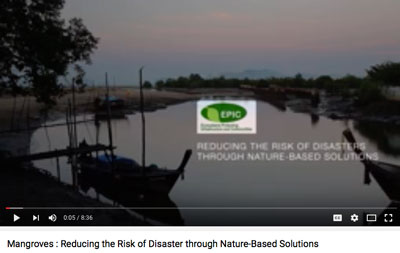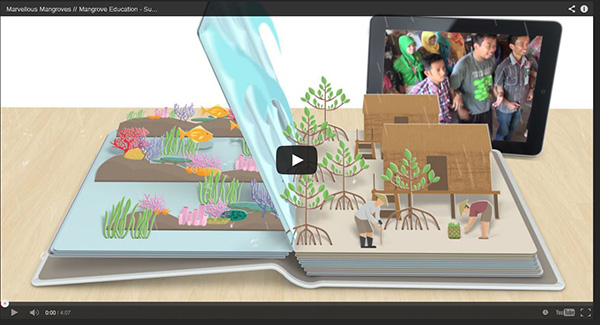|
The MAP News |
|
|
FEATURE STORY
Rampal power plant voted down yet project continues BANGLADESH - Demand of saving the world’s largest mangrove forest and a world heritage site, the Sundarbans, from Rampal power plant has dominated the mass vote arranged by green activists. After weeks of casting votes that began on October 30 and in participation of over 10,000 voters, the result of the mass vote was published at Dhaka University today. Prof Anu Muhammad, member secretary of National Committee to Protect Oil, Gas, Mineral Resources, Power and Ports announced the result at Aparajeyo Bangla premises. A majority 90.48 percent of the 10,111 votes cast went against the Rampal power plant. A remaining 8.51 percent voted for the plant that the government says is “for the development of the country”. “Rampal power plant is a curse. There will be no way to stop the pollution once it kicks off,” said Prof Dr Badrul Imam of Dhaka University’s geology department at the programme. Bangladesh government is going ahead with Rampal power plant in collaboration with India against mass protests and serious environment concerns that moved even the Unesco. Meanwhile, the national committee, which is spearheading the save Sundarbans movement, is preparing to launch massive protest programs in Dhaka at November-end to push their agenda. READ MORE Help Coastal Communities Restore Their Mangroves WORLDWIDE - Without the mangrove trees that used to protect them, Khun Nit and her grandchildren cannot sleep soundly because they’re frightened by the roar of the waves. Sometimes the waves reach the roof of their house. Khun Nit has lived on the coast her entire life, but she and her family can’t move any further inland. There is nowhere else to move. Villagers like Khun Nit and her grandchildren need support and training to protect and restore their mangroves so they can keep their home. You can give women like Khun Nit the skills and knowledge needed to become a local conservation expert, spreading awareness about the importance of mangroves, and empower her to train other women to do the same. LEARN MORE AFRICA Nigerian farmers, fishermen sue Shell in UK over pollution NIGERIA - Emere Godwin Bebe Okpabi, leader of Nigeria's Ogale people, unpacked four bottles of water from his homeland and lined them up on a table to show why his subjects are suing Royal Dutch Shell in a London court. The Nigerian water is contaminated with oil and cancer-causing compounds such as benzene. It's what his people drink every day. Britain's High Court will begin hearing lawsuits on Tuesday filed by the Ogale and Bille people alleging that decades of oil spills have fouled the water and destroyed the lives of thousands of fishermen and farmers in the Niger River Delta, where a Shell subsidiary has operated since the 1950s. They brought their fight to Shell's home base because they say the Nigerian courts are too corrupt. "Let the shareholders of Shell who are residents of the advanced world, like Britain, let them see a representative of a kingdom that is being destroyed for them to have money," he told The Associated Press on the eve the hearing. "That's blood money." London law firm Leigh Day is handling the cases after it won a landmark agreement from Shell to pay $83.5 million in compensation to the Bodo community for damage caused by oil spills in 2008 and 2009. Shell originally offered $50,000 before the Bodo took their case to the same U.K. court. READ MORE As oil palm expands, African nations agree to protect forests Congo - Central and West African countries have promised to protect their tropical forests from being cut down to make way for palm oil crops, in a declaration signed by governments representing more than 70 percent of Africa's tropical forests. Palm oil, one of the world's most widely used vegetable oils, is a fast-growing business and a major cause of tropical deforestation worldwide. The seven countries that signed the declaration in Marrakesh, where international climate talks are taking place, want to expand into the $50 billion global palm oil market. The countries, however, also are home to about 13 percent of the world's remaining tropical forest, particularly in the Congo Basin region. Those are at risk as the palm oil market expands, toward an estimated $88 billion a year by 2022, according to the World Economic Forum. "It's really exciting and important that these countries which are about to expand into the market have learned from the path that (Malaysia and Indonesia) took," Dominic Waughray, head of public-private partnerships at the World Economic Forum, said in a telephone interview. READ MORE ASIA 'Poverty alleviation' shrimp farms destroy mangrove forest, grab indigenous land MALAYSIA - A government-led shrimp farming project meant to tackle extreme poverty in northern Sabah, Malaysian, won local support in 2010 by promising job opportunities for impoverished indigenous communities. Six years on, mangrove forests local people depend on for food, materials and income are closed off and being cleared - but the jobs have yet to materialize. The first time that Olon Somoi heard about the shrimp farm was at the opening ceremony, on a day like any other in April 2013. She remembers feeling surprised and doubtful, as she attended the ceremony in the neighbouring village of Kuyuh. She felt even more hesitant when government officials handed out job application forms, but she could understand why other people in her village were eager to sign up. "We all need jobs", she thought. "Especially the youths." And yet she couldn't stop thinking that something wasn't right. READ MORE Nai Nang’s honey will “BEE” in the best hotels of Thailand!  THAILAND - Four years ago the community of Nai Nang in Krabi province, Thailand, started producing honey partly made from the mangroves flowers surrounding the village, but the most challenging part was how to market it. Most of the income and jobs around Nai Nang village are based on palm oil, rubber and fishing. The people asked themselves, “How can we make an income besides farming and fishing?” That’s when the idea of honey bees came along as several community members had already set-out bee boxes which had been colonized by the wild bee, Apis cerana. This is not only good for the environment, but also a great source of income and excellent for mangrove pollination. Mangroves are vital to this project, and MAP has provided technical support helping out with mangrove planting, drainage of the area allowing natural mangrove reproduction. But most importantly, teaching and educating the community so they can take care of the mangrove and continue with the restoration and conservation of this ecosystem. The mangrove is as vital to community as the community to the mangrove. READ MORE Indonesia just made a huge move to protect the climate  INDONESIA - A new decision from the government of Indonesia could be a major boon for both public health and the global climate. President Joko Widodo announced a moratorium on all activities that could damage the nation’s peat-filled wetlands, a move that could help prevent wildfires and billions of tons of carbon dioxide emissions over the next few decades. The action represents “the kind of leadership that the world needs right now,” Erik Solheim, executive director of the United Nations Environment Program, said in a statement. Indonesia is known for its tropical peatlands — bogs filled with carbon-rich, partly decomposed organic matter, or peat. Recently, though, Indonesia’s peatlands have been faced with growing threats from human activity, mainly agriculture. To make room for farmland, people in the region have taken to draining and drying the bogs, sometimes starting fires to aid them in clearing the land. READ MORE Fisheries body wants authorities to destroy illegal trawlers MALAYSIA - The Fisheries Development Authority of Malaysia (LKIM) wants authorities to destroy illegal trawlers in Malaysian waters to protect the rice bowl of local fishermen. LKIM chairman Datuk Seri Dr Irmohizam Ibrahim said his department was pushing the idea to the Malaysian Maritime Enforcement Agency (APMM) to be implemented. “I would like to suggest to the government to destroy boats and vessels of foreign fishermen so that it is a lesson and shows the seriousness of our government in protecting our resources,” he told Malay Mail Online in an interview. Irmohizam explained that most “pirates” were invading Malaysian waters especially in the East Coast which were eating into the profits of local fishermen. “The invasion of foreign fisherman in our waters especially in the East Coast raises concern mainly fishermen from Vietnam because the local fishermen are often troubled by them while fishing. READ MORE Mangrove growth adds to green cover INDIA - Non-cultivation of paddy fields along river banks and the growth of mangroves is helping increase Goa's forest cover. In its latest biennial assessment, forest survey of India (FSI) has reported a 5% increase in the state's forest cover. "The reason for increase in forest cover (in Goa) is mainly due to increase in mangrove areas," according to the FSI's, 'state of forest' report 2015. Pollution and fallow conditions of paddy fields cause their eutrophication, which helps growth of mangroves. This loss in agricultural area is a gain to the forest cover. Despite the general perception of state's shrinking forest cover due to rapid development, FSI's assessment indicates that the state's total forest cover of 2,219 sq km (59.94%), as per the previous assessment, has increased to 2,240 sq km (60.08%). READ MORE Kerala is finally realising the need to preserve its mangroves INDIA - There are hardly any mangroves left in Kerala, but now there is a realisation that preserving what is left and regenerating more will help combat climate change by sequestering carbon and buffering the effects of sea level rise For a state that has 44 rivers and a wide network of estuaries and backwaters with tidal action, Kerala has a relatively small area under mangroves – just 25 sq km at present, down from 700 sq km in 1957. The mangrove patches that still survive are distributed across many coastal districts. The mangroves in Kerala are unique in the sense that more than half are under private ownership, making conservation difficult. Mangrove conservation faces a double whammy, since private owners are not motivated enough to hold on to the unique vegetation, as it does not provide a direct and immediate economic benefit. For the state government, administering patches over which they have not control is difficult. READ MORE Replanting mangroves in Kachchh saves coast, people, world INDIA - Hassan Bhai stretches his sinewy, sun-tanned, fisherman’s arm’s across a large swath of the Gulf of Kachchh and proudly shows the mangrove plantation that people from his village, Luni, nurture. Dots of green bob up and down the waterline in high tide over a stretch seven kilometres along the coast. Hassan says the fishers love the mangroves, as fish grow, spawn and breed in them. They also protect the coast from storm surges, especially cyclones. An industry giant, the Gautam Adani group, that owns a port, power plant and a special economic zone in the nearby coastal town of Mundra, bankrolls mangrove regeneration — even though the move follows destruction of huge tracts. Hassan often finds himself hiring villagers on daily wages to plant mangroves, chasing away Kharai camels, a Kachchhi breed that graze on mangroves, and arguing with Rabari nomadic pastoralists who bring them. There is a buzz about mangroves in Kachchh amidst regeneration efforts and conflicts of interest. Still the buzz hides the real magic of mangroves in a warming globe. Mangroves are nature’s best carbon sinks. They soak up and store excess carbon dioxide that blankets and warms up the globe. READ MORE AMERICAS Marvellous Mangroves: Myths and Legends is Now Available! MAP Education Director Martin Keeley’s most recent book is Marvellous Mangroves: Myths and Legends, a compilation of stories from “Mangrove Peoples”—those who live on shorelines where mangroves thrive—from around the world. Those peoples range from Brazil’s northern states of Parà and Bahia, where the orisha Nanã personifies God as an old lady dressed in purple and white. Other cultures include the Sundarbans people, where Bonobibi is known as the goddess of the tiger as well as the mangrove forests, as well as communities across the Caribbean and West Indies, Australia, China, and Vietnam. With wonderfully evocative illustrations by Daniella Christian, the book is designed both to entertain and enlighten, and includes valuable information for classroom use. READ MORE Everglades mangroves might hold billion-dollar fix for climate change USA - The price of fighting climate change in South Florida has so far focused largely on the billions needed to install pumps, raise roads and retrofit the sprawling infrastructure that keeps the region above sea level. But South Florida might already have a valuable weapon that for ages has been sucking up carbon and keeping the planet cool: mangrove wetlands in the Everglades. To figure out just how valuable, scientists crunched some numbers to assign a price tag to Everglades National Park’s mangroves. It turned out way bigger than anyone thought. “It was kind of an alarming thing, like oh my gosh, who knew?” said Evelyn Gaiser, a wetland ecologist who has overseen Everglades research at Florida International University for nearly a decade. For about 360,000 acres of mangrove wetlands, the cash value totaled between $2 billion and $3.4 billion, or nearly seven times the amount Miami Beach plans to spend on new pumps to keep its streets dry. READ MORE LAST WORD Dear Friends This year marked the tenth anniversary of Phulbari outburst, where three people were shot dead and two hundred injured in a demonstration of 80,000 people in 2006 for opposing plans by a London-based AIM-listed mining company, Global Coal Management Resources (GCM). Formerly known as Asia Energy, the company wants to build a massive open cast coal mine in Phulbari, Bangladesh. The project threatens to destroy the homes, lands, and water sources of as many as 220,000 people, and forcibly evict an estimated 130,000 people. If implemented, it would destroy 14,600 hectares of highly cultivable land and would leave devastative impact on the world’s largest mangrove forests and UNESCO heritage site, the Sunderbans. READ MORE BACK TO TOP Not yet a subscriber? Click here to subscribe. Please cut and paste these news alerts/ action alerts on to your own lists and contacts. Help us spread the word and further generate letters of concern, as this can make a big difference in helping to halt a wrongdoing or encourage correct action.
|
Action Alerts:Marvellous Mangroves: Myths and Legends is Now Available!
|
Mangrove Action ProjectClick here to view past newsletters |
|
Search News Archive
Thursday, December 8, 2016
MAP News Issue 405 - December 10, 2016
Subscribe to:
Post Comments (Atom)
-
The community of adults and youth in Cayman Islands has come together recently to release a series of educational videos. Each is geared to...
-
By Alfredo Quarto, Program & Policy Director Co-founder, MAP There is a rather urgent situation concerning the bio-invasion of the Son...
-
By: Isabel Robinson, MAP Volunteer Intern Some months ago I decided to come to Thailand and do an internship in mangrove conservation, ...
MAP News Issue #596 = April 20, 2024
ENTRIES NOW OPEN! Mangrove Photography Awards 2024 10 Years Celebrating Mangroves GLOBAL - MAP has launched our 10th Mangrove Photograp...










No comments:
Post a Comment
Note: Only a member of this blog may post a comment.